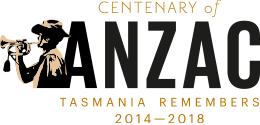Alec Campbell
The kid who became the last man standing
“Dad often used to joke that if he went to war at 16 he would probably be the oldest ANZAC left. Years ago, in the 1930s, that was his joke on Anzac Day. He realized even then that as the youngest Anzac there was a distinct possibly he would be the last one left alive”.
- Gallipoli: Our Last Man Standing: The Extraordinary Life of Alec Campbell by Jonathan King page 201
Alec Campbell was born on 26 February 1899, in Launceston.
Alec was a student at Scotch College when World War One started in 1914. The following year, when Alec was working as a clerk, he falsified his age up to 18 years and five months in order to be an eligible age to enlist on 2 July 1915.
Private Campbell arrived at Gallipoli in October 1915 with the 15th Battalion and remained there through to the evacuation. During his time at Gallipoli, Private Campbell dodged bullets and saw mates shot as he carried water, ran messages and stood sentry.
While Private Campbell was lucky not to be hit by the shelling, shrapnel and snipers, he did sustain a lifelong injury, which he recounted to Jonathan King, author of Gallipoli: Our Last Man Standing: The Extraordinary Life of Alec Campbell.
“The fellow in front of me got shot and fell backwards into the trench, knocking me over, which could have saved my life. He did not hit me, but he fell back and the rifle clouted me in the head.” (Alec Campbell to Jonathan King, page 82)
The injury destroyed a facial nerve in Alec Campbell’s cheek in front of his ear.
“In time, this would paralyse the muscles in the right side of his face and lead to …Bell’s Palsy, which eventually prevented him from closing his right eye, smiling properly or showing his teeth. The attacks of paralysis came and went during his younger years, but as he got older the condition produced an increasingly unsightly facial disfigurement. As an old man he lost his right eye.” (King, page 82)
After the evacuation from Gallipoli, Private Campbell became very ill and was discharged in August 1916. “Flu would knock him out of the war and plague his health for the rest of his life.” (King, page 88)
A long life after the war
The disability Alec brought back from the war did not hold him back, but spurred him on to a life of success and achievement.
Alec’s life after the war was full. He:
- learned carpentry and car and wagon building;
- won a Tasmanian flyweight championship;
- became the president of the Australian Workers Union Tasmania branch in 1942;
- learned to sale and competed in at least six Sydney to Hobart Yacht Races;
- completed an economics degree;
- worked in the public service as a disabled persons' employment officer and assisted incapacitated World War 2 veterans;
- married twice and had nine children and 32 grandchildren;
- worked for the Heart Foundation until retiring at the age of 80; and
- continued to drive until he was 95.
Going back to Gallipoli
In 1990, Alec returned to Gallipoli as part of a trip organised for veterans to commemorate the 75th Anniversary of the Gallipoli campaign. Alec looked forward to seeing Anzac Cove again:
“Anzac was a beautiful little cove….The thing that was wrong was the conditions…the lice…the fleas…the flies …all those things made it intolerable, and the poor food, and the sickness and the dysentery. But the place itself was beautiful.” (King, page 192)
Man in a million
Alec Campbell became the last Anzac in June 2001, following the death of Gallipoli veteran Roy Longmore in Melbourne, at the age of 106.
“An international search soon confirmed that Alec was not simply the last Australian but probably the last man standing from any country that had fought at Gallipoli in 1915. As the sole survivor of an estimated one million soldiers who participated in the campaign on all sides…he had become a ‘man in a million’. Little wonder the national spotlight now picked him out.” (King, page 207)
Alec Campbell died of pneumonia on 17 May 2002. A State Funeral was held in his honour, at which the then “Governor-General Peter Hollingworth described Alec’s passing as ‘an occasion for Australians to pause and reflect on the passing of the generation that gave us our identity and character as a nation’.” (King, page 209)
References
Gallipoli: Our Last Man Standing: The Extraordinary Life of Alec Campbell by Jonathan King published by John Wiley and Sons Australia 2003



